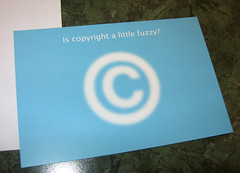 Image by PugnoM via Flickr
Image by PugnoM via Flickr
REGISTER FOR CASH
Let's say you've composed a song, gotten it exactly how you want it, and have written it down or recorded it. It's not plagiarized and it has some creative spark. Under current
U.S. copyright law, satisfying these criteria alone means you have a natural
copyright and your work is protected. It's advisable, however, to register your song with the
Library of Congress as soon as possible to establish a public record of it. In most cases, it must be registered before you can sue someone for infringement or collect compulsory
mechanical-license royalties.
The Library of Congress Copyright Office classifies your new song composition as a Performing-Art Work. Fill out Form PA to register a
musical composition only. This is useful for
artists who are strictly
songwriters. Send the completed form, a nonreturnable copy of your material and a $45 registration fee to the Library of Congress Copyright Office in
Washington, D.C. For compositions, acceptable materials include a manuscript (lead sheet, full
sheet music, or orchestrations) or a phonorecord (tape,
CD, MP3 on disc). Make sure you include the entire song--everything you want protected--in your submission.
Your registration becomes effective when the Copyright Office receives it. In a few months you will receive a certificate of registration.
Those who are both writers and recording artists may register their composition and the accompanying recording at the same time and for one fee by using Form SR. In that case, you would send your song on a phonorecord only.
Also use Form SR to register sound recordings only (ideal for performers who don't write their own music). The application process and the fee per submission are the same as for musical compositions. Remember that the material you send for a
sound recording must be a phonorecord and can't be a manuscript or audiovisual work such as a movie,
music video or other multimedia format.
More tomorrow...
 Image via Wikipedia
Image via Wikipedia




